Must-Have Features for Successful Real Estate Mobile App Development in 2024
July 15, 2024 • 238 Views • 20 min read
Bohdan Vasylkiv
CEO & Co-Founder
The property technologies market is expected to reach 47,842.5 million US dollars by 2033. The rapid pace of real estate app development and integrations is among the main reasons for such great numbers.
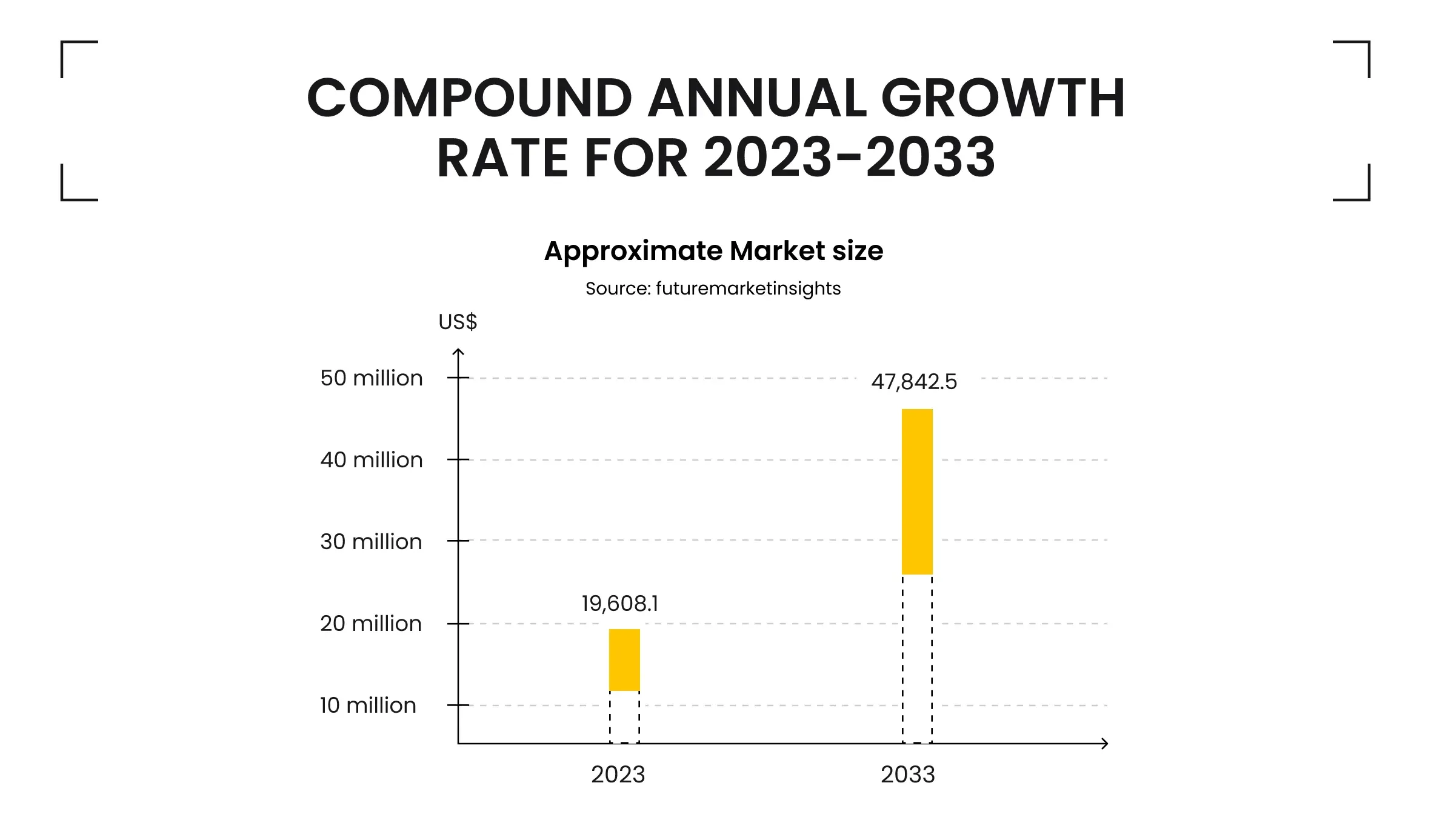
Frankly, it is hard to imagine any modern industry without software technology. With the emergence of the IT sphere and all its benefits, it becomes irrational to ignore software implementations.
However, it is worth learning about your market and audience before adopting or integrating real estate applications. This is the only way to build a real estate app to compete with rivals and provide users with the best and most efficient features.
Therefore, before starting your custom mobile application development for the real estate industry, let’s learn what you should include to succeed.
Types of Real Estate Apps
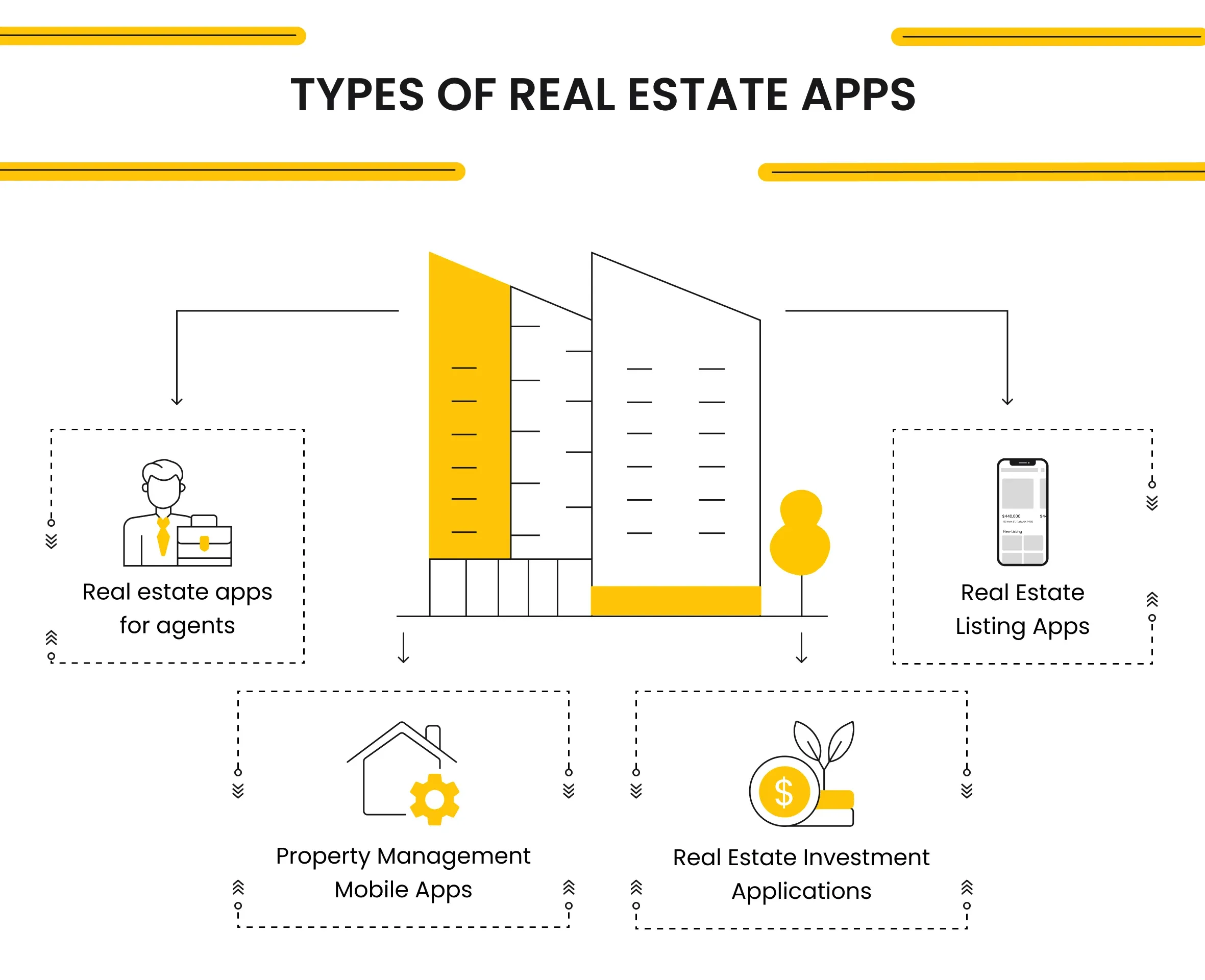
The first and most crucial task is defining the types of real estate applications: knowing the difference between them helps to choose the most suited real estate mobile app features and shape a better software development plan.
Like any other industry, the real estate mobile application development market can divided into a few subtypes by the offered services and user categories:
- A real estate app for agents designed to simplify the working routine of agents and agencies, offer business process automation options and improve overall business efficiency.
- Property selling apps and house searching apps, targeted at potential clients who are looking to buy or rent a new place; The main goal of these real estate applications is creating a user-friendly and seamless process of finding required property assets, searching for various options, and comparing real estate offers.
- Property management mobile app requires a different real estate app development approach. This type of real estate application is designed to increase the customer’s property functionality by offering household management in a single mobile app.
Each of these real estate applications has unique requirements and specifics: it is inconceivable to build a real estate app that will meet all the expectations of each standalone target group.
Real Estate Agent Apps
First, let’s discuss the core functionality of a real estate app for agents. Any real estate app for agents must offer user-friendly and convenient functionality designed to simplify the working routine of property agents. This type of real estate mobile app development includes numerous solutions, starting with simple construction management software and ending with complex and scalable real estate MLS app options.
To cut a long story short, apps for real estate agents have various development phases and feature combinations. This type of software is very user-specific and must correspond with the demands and requirements of business owners. While some patterns and common views on such real estate app development solutions exist, they are still rather custom and unique.
Such real estate app development serves business goals and demands, i.e., it includes only mobile apps for agents and business options like real estate CRM with mobile app.
Real Estate Listing Apps
It is hard not to mention real estate listing apps when we discuss real estate app development solutions.
These are the basic options for any real estate application designed for potential buyers or renters. In a nutshell, these real estate applications offer the possibility to list and search for property options, manage realty assets, and more. Applications with such features are commonly used as property selling apps or house searching apps.
To simplify, when you need an online property marketplace or anything related to such functionality, you have to build a real estate app with a listing option first.
Property Management Mobile App
Last but not least real estate app development solution is creating a property management mobile app.
The reason for such real estate mobile app development is simple - it offers the possibility of managing and tracking various household processes in a single app on a smartphone.
For instance, you can link your security system and connect various household appliances, thermostats, etc.
The only modern difficulty with such real estate applications is that many devices and household appliances are commonly distributed with their management application, sometimes making it hard or impossible to connect a device to a third-party app.
Real Estate Investment Applications
One of the recent trends in the mobile realty apps industry is the development of property investment applications.
These PropTech apps aim to offer users investment options, allowing them to benefit the most from their assets. However, allowing users to invest even small amounts of money is crucial: not everyone can afford to cover the cost of a family house at once.
To cut a long story short, real estate investment apps share similar features to property listing or buy/sell platforms. For example, users must have a property listing option, in-app payments, etc. Besides, this type of mobile realty apps must be highly customizable to offer better user experience and scale on demand.
Key Features of a Successful Real Estate App Development
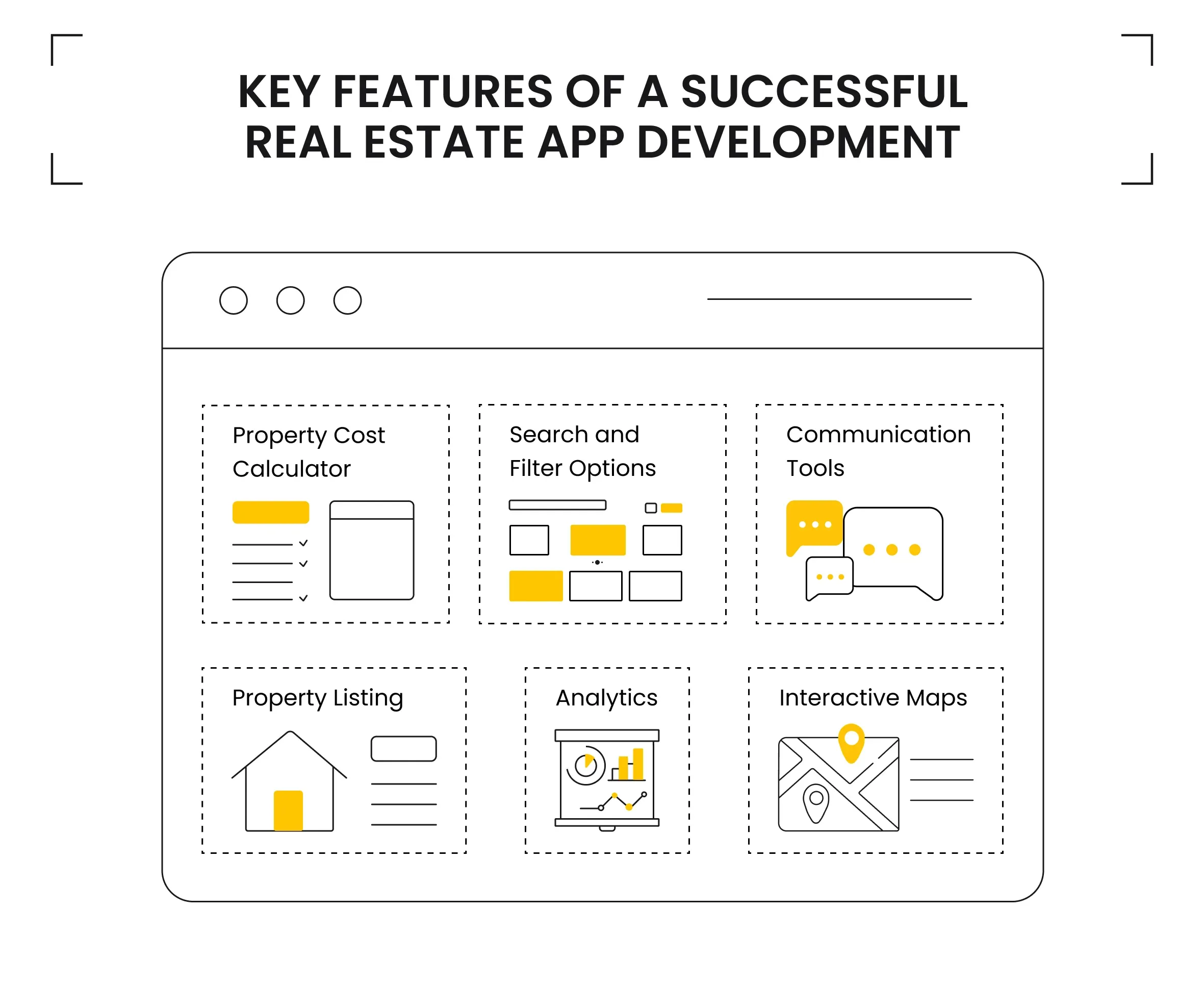
Each successful real estate mobile app development depends on the core features you plan to implement.
Real estate mobile app features impact numerous processes and aspects, such as an app's efficiency, usability, development time, and, of course, real estate app development cost.
So, to succeed in mobile app development for real estate, you have to define your business goals and perform market research to know exactly what your target audience expects and needs.
One of the best approaches to any software development project, especially for a startup, is to start with a Minimum Viable Product or simply MVP. The main purpose of minimum viable product is to create a basic app version that is faster, easier, and cheaper to design and develop. Besides, it helps to avoid risks and test your concept first.
To make it simple, in terms of MVP startup development for real estate business, you will need to:
- Define the core real estate mobile app features that meet your business goals and user expectations
- Find and hire a dedicated development team, familiar with the industry and capable of delivering the expected results
- Go live and analyze the users' feedback and reactions to learn what should be improved or added.
Fortunately, the Incora team can easily help you with each of the previous real estate app development needs. First, let’s briefly discuss the core features of real estate mobile app development.
Property Listings
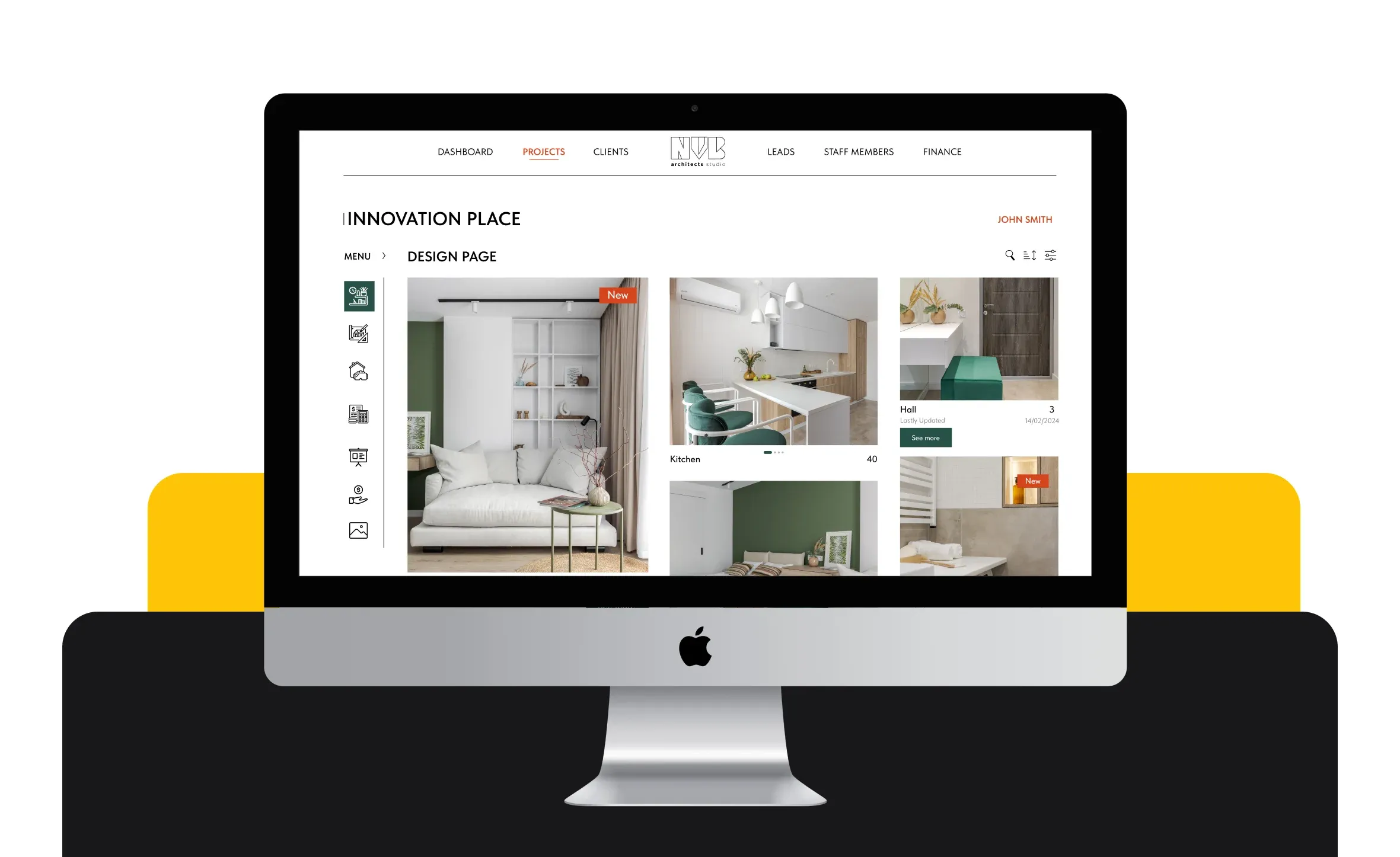
One of the most essential features of real estate mobile app is property listing.
Apart from displaying relevant results, it also must be supported by extra functionality like sorting and categorizing, keyword search, etc.
This feature is crucial for each type of real estate software, not only house searching apps or property selling apps. For instance, apps for real estate agents also must offer the possibility to track and keep informed about available or reserved property assets.
Search and Filter Options
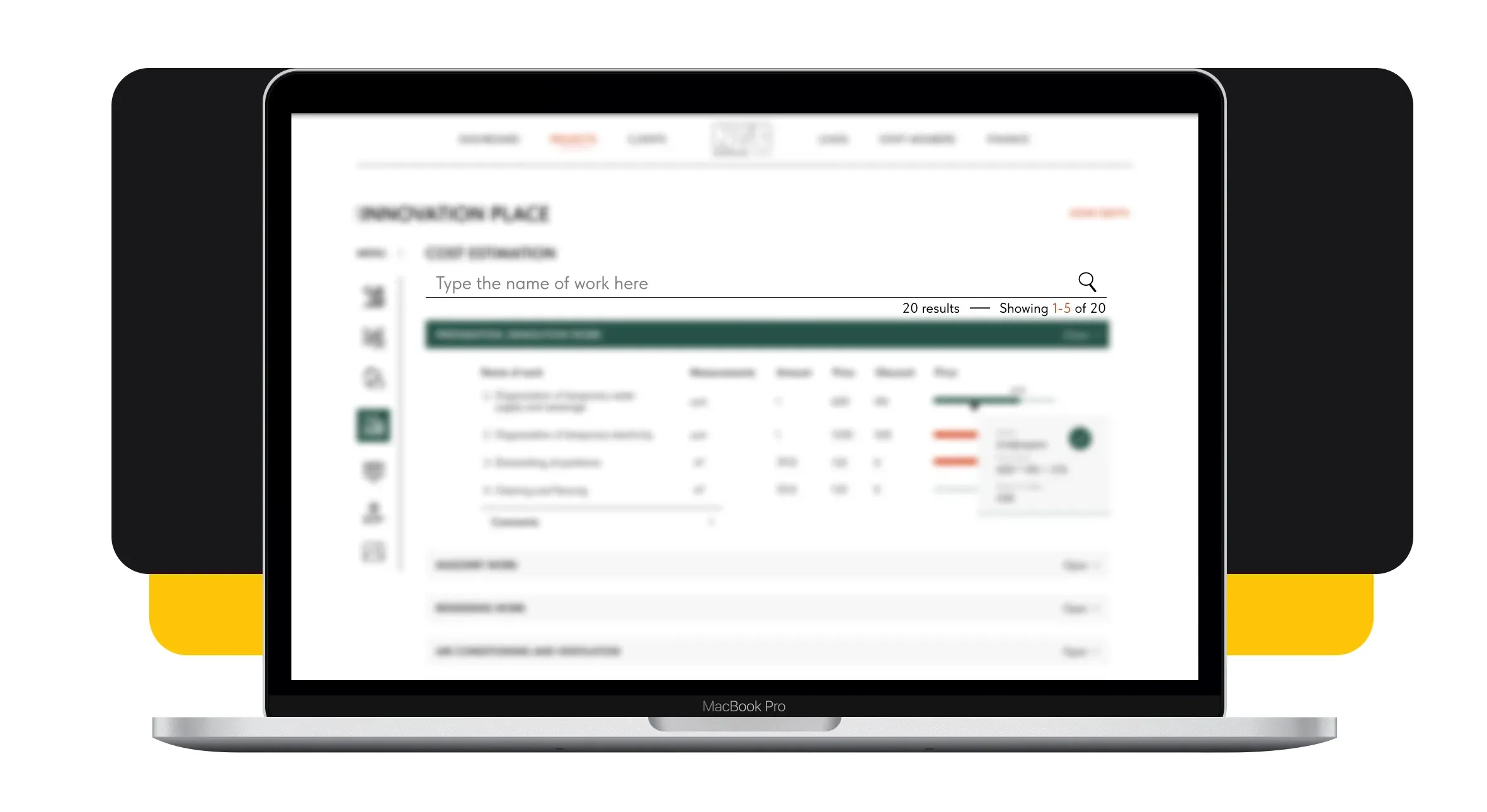
Each property listing can be improved and upscaled with countless options. However, the most crucial are search and filter options. These features are relatively simple to integrate yet are must-have functionality for any list:
- Search is vital when a user knows exactly what they are looking for, checking for updates on certain property assets like additional information about the house, or tracking how prices change.
- Filtering or categorizing is also a must-have option. It helps to narrow down and specify the search, such as whether a user is looking for the cheapest house to buy or the most convenient store to rent.
Interactive Maps
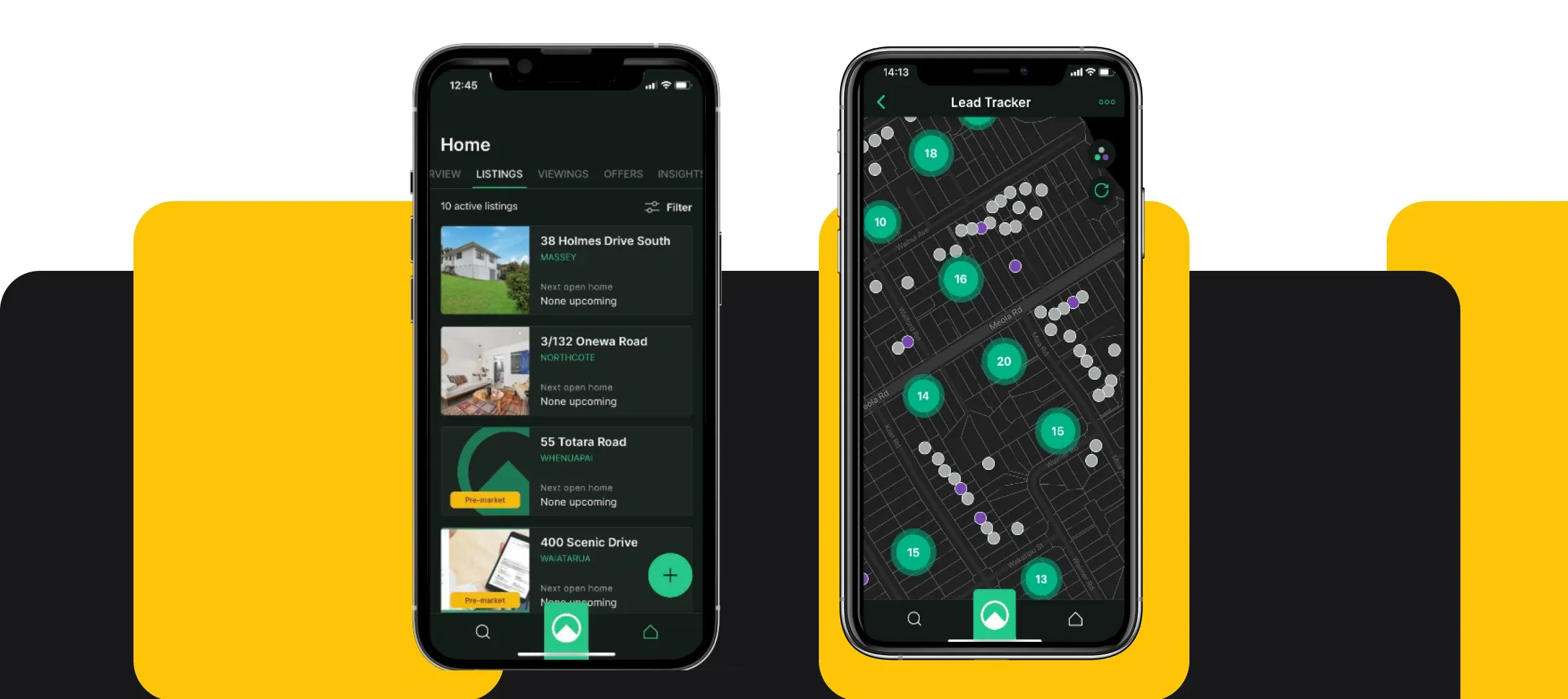
Don’t forget about interactive map feature integration during real estate application development.
Clearly, the location of property assets is essential. Real estate applications must provide users with as many details about property options as possible.
Fortunately, there is no need to develop map applications from scratch. Instead, you can easily integrate a ready-made map like Google Maps or any other API solution.
Communication Tools
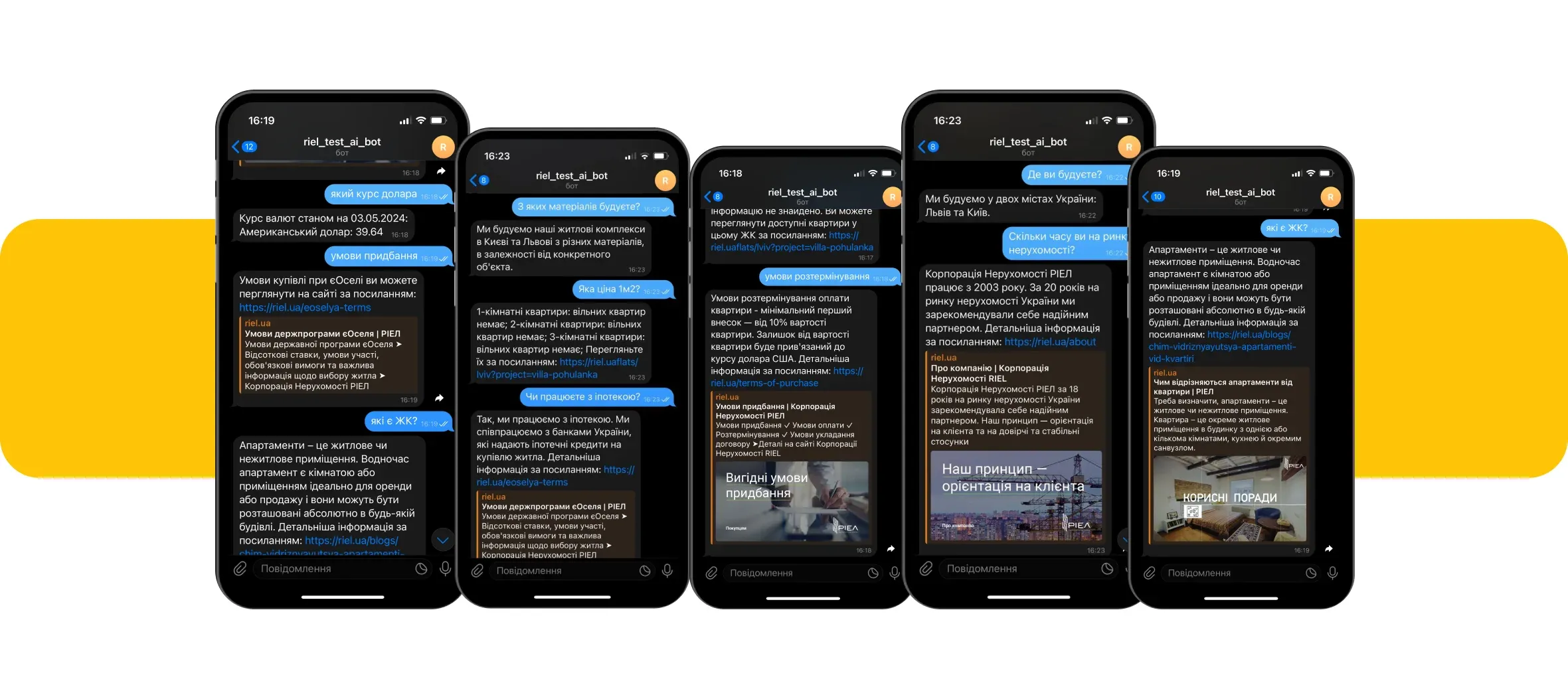
Built-in communication tools are also crucial for any real estate application development. In the case of a property marketplace, the reasons for enabling communication are obvious. However, it is not as clear in the case of real estate CRM development or other management apps for PropTech.
To sum up, having a way to communicate with the rest of the team in-app, or at least leaving hints or comments on specific tasks and topics, is a crucial add-on worth implementing.
Analytics and Reports
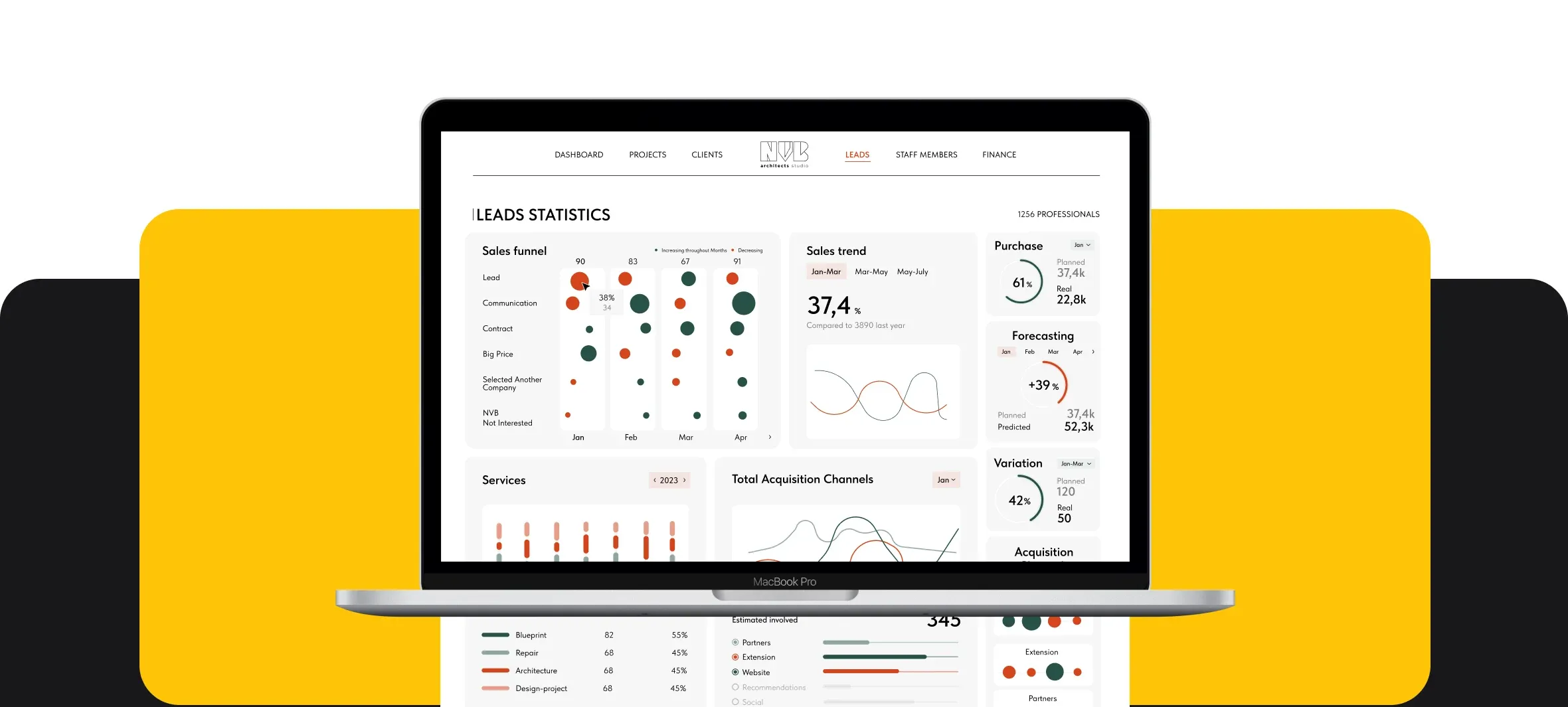
Any real estate mobile app developer will probably tell you that analytics and report features are included in almost any type of property application.
As with the rest of business industries, the more knowledge, insights, and statistics you have - the better and more efficient your work is.
So, don’t underestimate the role of various built-in dashboards or other tools that can help gather and analyze different statistics and reports. Such instruments can also improve and upgrade the rest of the functionality, such as property cost calculators.
Property Cost Calculators
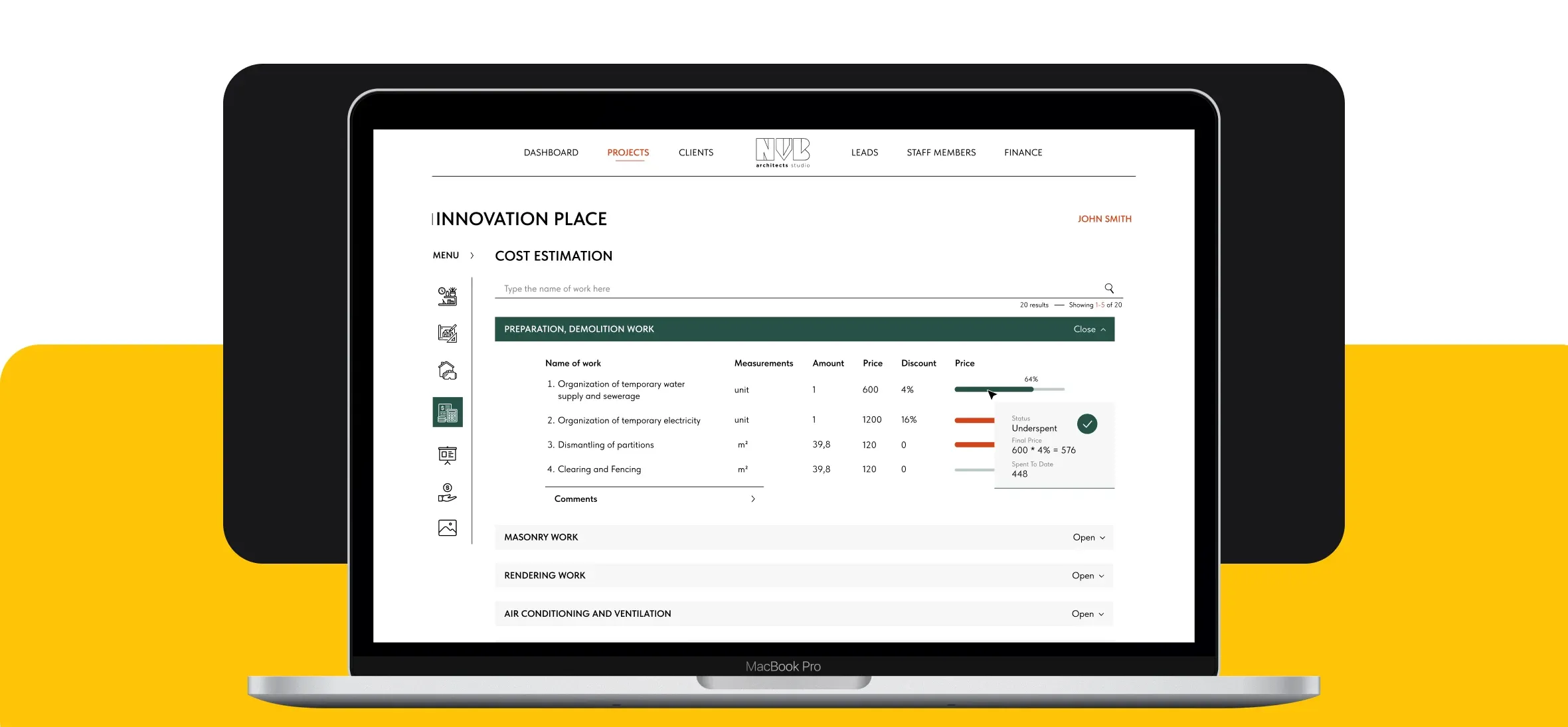
This feature is not always a must-have but a very convenient and user-oriented option that can make your product even more competitive.
For instance, combined with reports and analytics tools connected to the real estate MLS app, property cost calculators can offer more accurate market predictions and analysis, create mid and long-term predictions, or simply update property costs to match the market.
Advanced Real Estate Mobile App Features
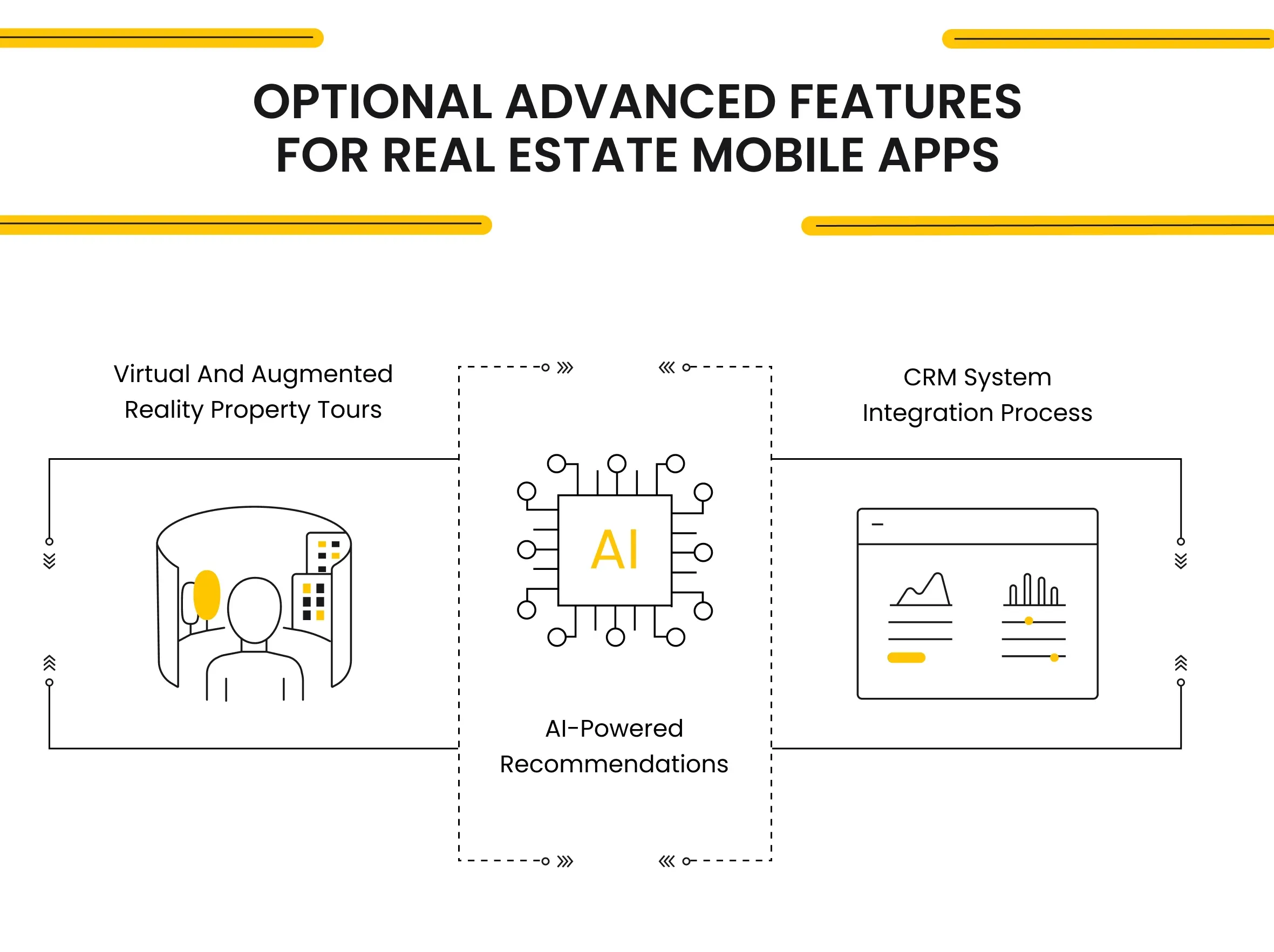
Apart from common and key features for real estate application development, we can also list a few advanced real estate app development solutions that have recently gained popularity.
Virtual Tours and Augmented Reality
Virtual and Augmented Reality are great ways to increase the popularity and usability of your app, offering users new ways to evaluate and review the property they might be interested in.
Nevertheless, developing such features requires skilled real estate app developers familiar with VR and AR technologies and the engagement of specified hardware to create 3D property models.
AI-Powered Recommendations
Another beneficial practice is using artificial intelligence in mobile app development. Having a built-in AI model capable of recognizing user behavior and offering related recommendations is an excellent advantage to any business.
Still, despite the overall simplicity of integrating ready-made artificial intelligence into an app, not every real estate mobile app developer can set it up correctly. Once again, to embody such a great feature, you must find professional real estate app developers familiar with various technologies, including AI.
Integration with CRM Systems
Real estate CRM with mobile app integration simplifies access to the client base and other related information, enabling it on the go.
Frankly, developing a custom CRM system is a higher priority: such real estate applications offer more options and solutions for business growth and improvement. Still, most CRM systems are unsuited for mobile phones, so creating real estate CRM with mobile app options can bring extra benefits. Yet, mobile CRM versions are “extras,” which won’t be beneficial until you create a working CRM.
How Much Does it Cost to Build a Real Estate Mobile App?
Talking about mobile app development for real estate, it is hard not to mention its cost.
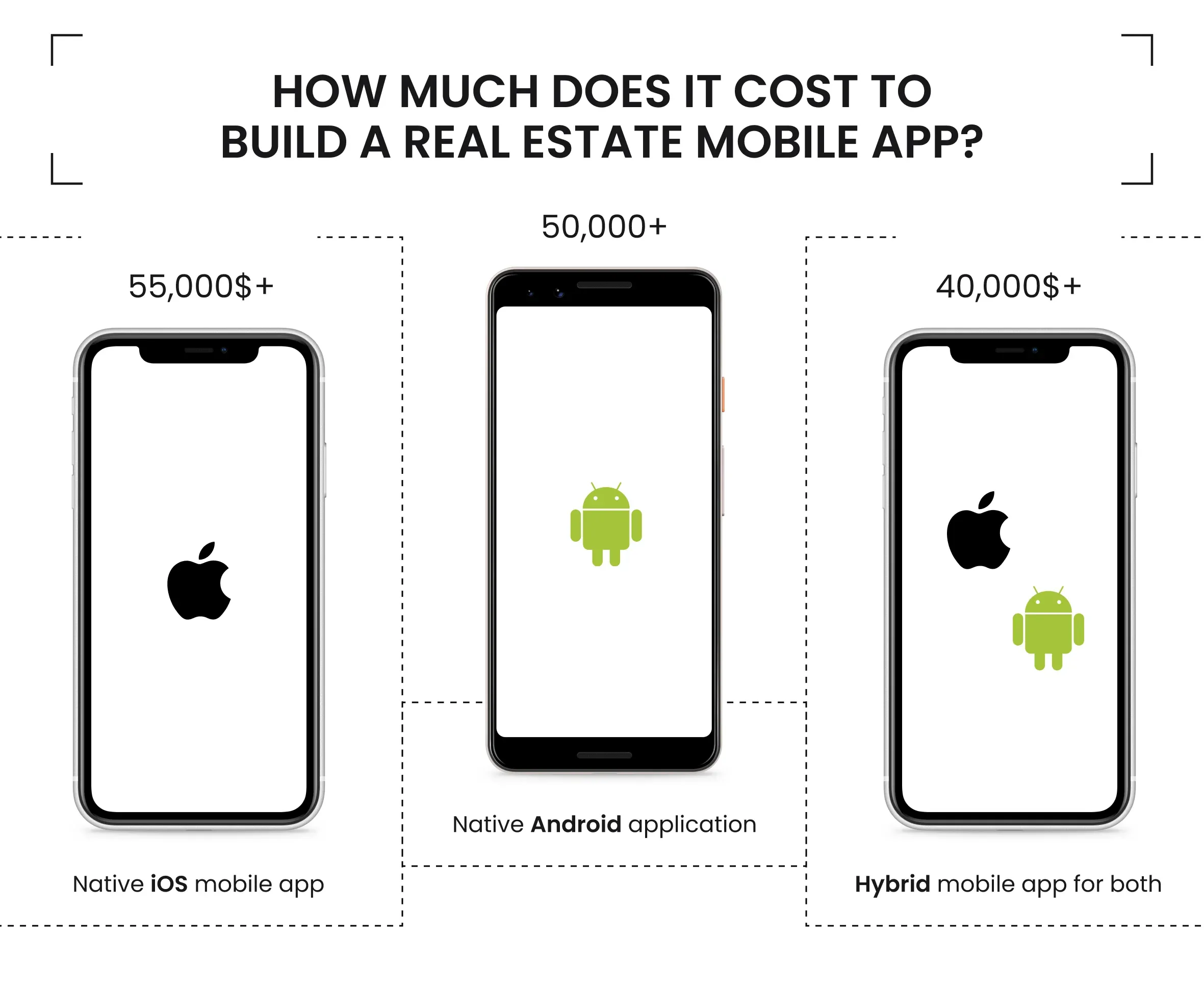
It is impossible to name the exact real estate app development cost.
Like with any other software development, the real estate app development cost depends on multiple factors. Some of these aspects are unrelated to the real estate industry. For instance, development time and project complexity are among the top factors impacting the development cost.
However, if you want at least approximate numbers, it is possible to say that:
- Native iOS mobile app development for real estate cost will start from 55,000$, depending on the number of features to create, used tech stack, developers’ expertise, and time for development
- Native Android real estate mobile application development starts at 50,000$, and the final price depends on the same factors as before
- Hybrid mobile real estate app development cost is cheaper and can be done for 40,000$+. Yet, such apps are limited in functionality and performance, compared to native applications. On the other hand, the same app can be adjusted for both platforms very quickly.
Still, the best way to choose the best real estate mobile app development approach is to find a trustworthy real estate mobile app development company like Incora.
Our Experience with Real Estate Mobile App Development
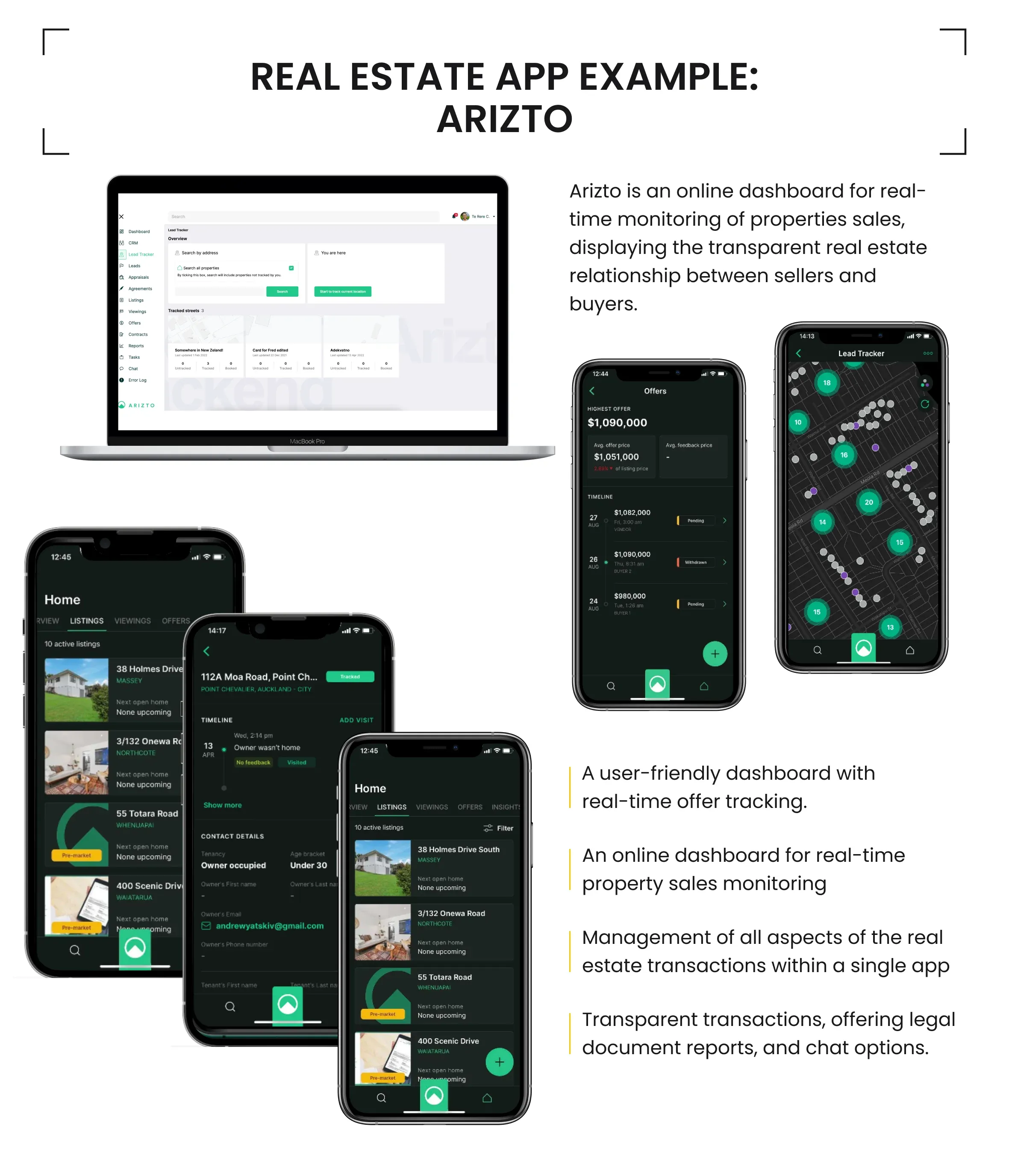
Our Incora software development team has experience building mobile realty apps. Moreover, in addition to real estate mobile app development, we were involved in various PropTech projects, such as CRM creation or business consulting. For more information, you can check out our latest case studies.
One of our latest mobile app development for real estate projects, Arizto, is an excellent example of real estate app development solutions for businesses.
It is a web-based PropTech application with a mobile version that offers user-friendly property selling and buying opportunities. Additionally, it includes dashboard features for a transparent full-cycle coverage of the property selling/buying process.
So, suppose you are looking for similar real estate app development solutions or are interested in the PropTech sector. In that case, you can contact us to discuss your ideas and determine the possible outcome of investing in real estate mobile app development.
What’s your impression after reading this?
Love it!
1
Valuable
1
Exciting
1
Unsatisfied
1
FAQ
Let us address your doubts and clarify key points from the article for better understanding.
What is real estate app?
A real estate app is a mobile application designed to assist users in buying, selling, renting, or managing properties. It typically includes features like property listings, virtual tours, price comparisons, mortgage calculators, and direct communication with real estate agents. These apps aim to simplify the real estate process and provide convenient access to property-related information and services.
How do real estate apps make money?
Real estate apps make money through several methods, including:
- Advertising: Charging real estate agents, brokers, and property managers to advertise their listings.
- Premium Listings: Offering property owners and agents the option to pay for premium listings to increase visibility.
- Lead Generation: Charging fees for providing potential buyer or renter leads to agents and brokers.
- Subscription Fees: Offering subscription plans with additional features for real estate professionals.
- Transaction Fees: Taking a commission or service fee on transactions facilitated through the app.
These revenue streams help real estate apps maintain their services and continue to innovate.
Why a real estate agent needs a mobile app?
A real estate agent needs a mobile app to efficiently manage listings, communicate with clients, schedule appointments, and access market data on the go. It enhances productivity, improves client service, and helps agents stay competitive in a fast-paced market.
Why is real estate app important?
A real estate app is important because it simplifies the property search and transaction process, providing users with convenient access to listings, market data, virtual tours, and communication tools. This enhances the efficiency and effectiveness of buying, selling, or renting properties.
YOU MAY ALSO LIKE
Let’s talk!
This site uses cookies to improve your user experience. Read our Privacy Policy
Accept
Share this article